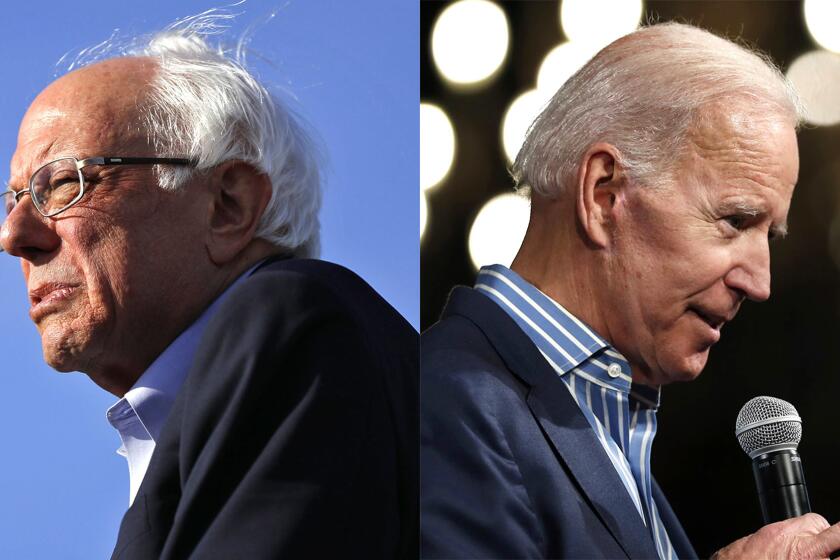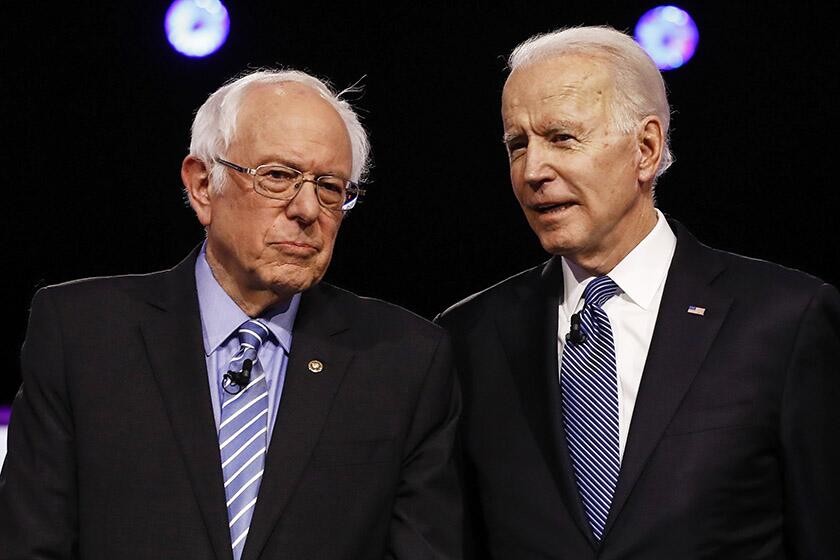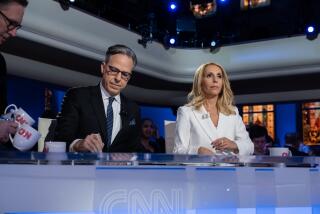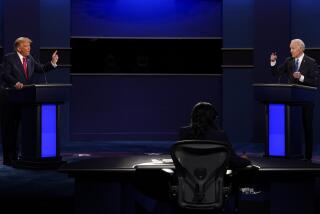Everything you need to know about the South Carolina Democratic debate
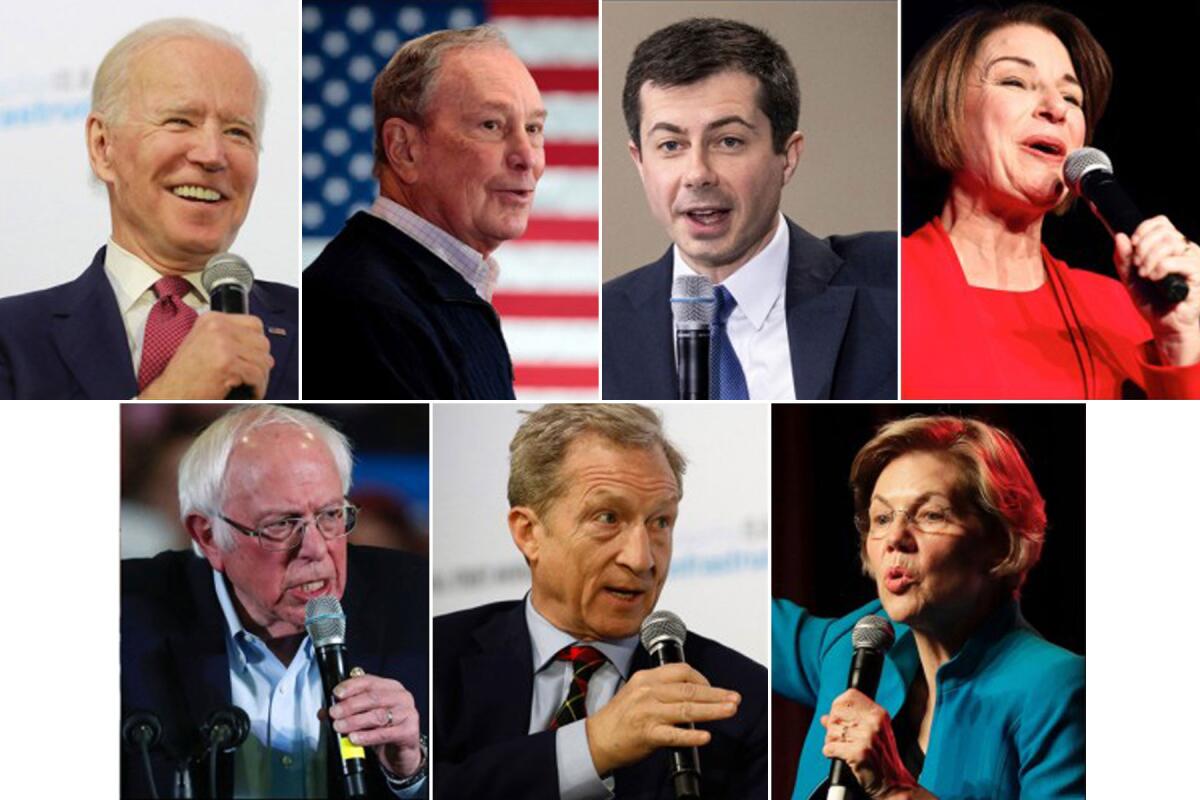
- Share via
Who needs a full week between debates, anyway? Six days after Democrats squared off in Las Vegas, they’re back for another round in Charleston, S.C.
Seven presidential contenders are taking part in the 10th Democratic presidential debate on Tuesday night, four days before voters pick between them on the Feb. 29 South Carolina primary and a week before Super Tuesday, when a third of the primary season delegates will be up for grabs.
At a time when only a few campaigns can afford to air an endless stream of TV ads, Tuesday night is one of the last (free) chances candidates have to make their case to voters in those states.
Sanders and Bloomberg came under attack and candidates talked about coronavirus, sexism, and their personal mottoes in the last Democratic presidential debate before South Carolina votes Saturday and California and 13 other states vote March 3. Catch up on what happened here.
And if that wasn’t enough pressure, we’ve now reached the “I’m not dropping out, why don’t you drop out?” phase of the primary … at least among everyone not named Bernie Sanders. The Vermont senator won a decisive victory in the Nevada caucuses on Saturday, cementing his status as the likely front-runner. If there’s a window for another candidate to emerge as a viable alternative to Sanders, it’s rapidly closing.
At the very least, the candidates will try to have a better debate night than Michael R. Bloomberg did last week. After weeks of boosting his campaign on TV, the former New York City mayor struggled to defend his record as he was attacked from every end of the stage. The question is whether Sanders’ upward trajectory will take some of the pressure off Bloomberg.
What time is the debate?
The debate runs from 5 to 7 p.m. Pacific time. CBS News and the Congressional Black Caucus Institute are hosting, with Twitter as a debate partner.
“CBS Evening News” anchor Norah O’Donnell and “CBS This Morning” co-host Gayle King are co-moderators, with additional questioning from CBS correspondents Margaret Brennan, Major Garrett and Bill Whitaker.
How do I watch?
The debate is airing on CBS News and BET. It is also being livestreamed on Twitter and CBSN, CBS’ free online streaming service.
Who is on stage?
Former Vice President Joe Biden; former New York City Mayor Michael R. Bloomberg; former South Bend, Ind., Mayor Pete Buttigieg; and Sens. Amy Klobuchar of Minnesota, Bernie Sanders of Vermont and Elizabeth Warren of Massachusetts qualified. Billionaire Tom Steyer, the hedge fund manager turned philanthropist who failed to make the stage in last week’s debate, beat the deadline by a day, getting the last poll he needed to qualify on Sunday.
Rep. Tulsi Gabbard of Hawaii did not qualify.
To get on the debate stage, candidates had to win at least one national delegate from one of the three states that have held contests, or reach a polling threshold. They needed to hit 10% support in four Democratic National Committee-approved national or South Carolina polls, or 12% in two South Carolina polls, all conducted between Feb. 4 and 24. Steyer’s second qualifying South Carolina poll showed him with 18% support in a CBS/YouGov survey.
Here are 2020 Democratic presidential candidates Joe Biden and Bernie Sanders’ plans on healthcare, immigration, climate, gun control and housing and homelessness.
Is Bloomberg going to have another bad night?
Even Bloomberg’s campaign acknowledged it took him 45 minutes — out of two hours — “to get his legs on the stage.” Whether he does a better job of responding to criticism depends on the strength of his debate prep, but the attacks will almost certainly come.
Warren, in particular, breathed new life into her campaign during the Las Vegas debate with her grilling of the former mayor on his past defense of the stop-and-frisk policing strategy that targeted black and Latino males, and accusations that he’s made sexist comments to and about women, particularly at his company Bloomberg LP.
She focused much of her attention on his use of nondisclosure agreements to settle discrimination or sexual harassment complaints against him and his company, calling on him to release all the women who had signed NDAs with the company. Two days after the debate, Bloomberg agreed to release three women from the agreements if they contact Bloomberg LP. Warren said that was not enough.
Bloomberg has also started a semi-feud with Buttigieg in recent days. Ahead of the Las Vegas debate, Bloomberg released a memo calling on the former South Bend, Ind., mayor, as well as Biden and Klobuchar, to drop out so the New Yorker could unite the moderate wing of the party against Sanders.
Buttigieg responded a few days later with his own memo calling on Bloomberg to drop out. He cited the billionaire’s disastrous debate debut as evidence that he’s not capable taking on Sanders, let alone President Trump.
Both candidates are presenting themselves as the only moderate in the race with a chance of catching up to Sanders ... once everyone else drops out. Buttigieg has pointed to his Iowa caucuses win and his close second-place finish in New Hampshire, and Bloomberg has based his case on his massive campaign infrastructure, ad spending and polling in the contests following South Carolina.
Both campaigns made the same claim: that Sanders would be too liberal to win in a general election, but he has enough support to win the primary if failing campaigns keep running.
So 2/7ths of the candidates on stage are billionaires?
Yes, though only one of those billionaires will be on the ballot in South Carolina. Bloomberg elected to skip the four early-voting states to focus his time and money on the 16 elections — including California’s — held March 3, or Super Tuesday. His spending is nearing half a billion dollars so far.
Steyer has invested heavily in South Carolina and it appears to be paying off, particularly with black voters. The same CBS poll that allowed him to qualify for Tuesday’s debate showed his support in the state rising from 2% among black voters in November to 24% in February.
But Tuesday’s debate isn’t just about who’s going to win South Carolina. It’s also about whose campaigns will make it to the Wednesday after Super Tuesday. As we saw last week in Las Vegas, the campaigns that have struggled to gain ground in the early voting states are getting increasingly aggressive with the candidates leading in the polls.
Joe Biden is the likely Democrat nominee to face President Trump now that Bernie Sanders has suspended his presidential campaign. Meet the candidates.
You mean leading candidates such as Sanders?
Yes, except Sanders isn’t just leading in polls; he’s leading in the delegate count.
Before Nevada, Sanders lost narrowly in Iowa and won by less than 2% in his neighboring state of New Hampshire, leaving him open to questions about the strength of his support and his position as a front-runner. Nevada may have changed that.
Sanders’ rivals will likely bring up last week’s news that U.S. officials recently informed the senator of Russian attempts to boost his campaign as part of their effort to interfere with the U.S. election.
Bloomberg and Biden, two strong gun-control advocates, also see an opportunity to go after Sanders on his past record on gun control. Sanders voted against the 1993 Brady bill, which mandated federal background checks on gun sales, because he opposed the five-day waiting period on purchases. He may also face further accusations that he hasn’t done enough to stop some of his supporters from harassing his opponents and critics.
Buttigieg will likely continue to go after Sanders as polarizing. Last week he said Sanders wants to “burn” the Democratic Party down (and that Bloomberg wants to “buy the party out”). After his distant third-place finish in Nevada and dim prospects in South Carolina, he’s not likely to ease up on anyone on Tuesday.
What else should we watch out for during the debate?
Black voters make up about 60% of the Democratic electorate in South Carolina, making the state the first real test of candidates’ support with the most reliable part of the Democratic base. Past debates have focused on racial disparities in criminal justice, but Tuesday night is a chance for the moderators and candidates to dive into disparities in other issues such as maternal mortality, income and wealth, student loan debt and homeownership.
Candidates might also be asked about gun violence and the rise in domestic terrorism threats from white nationalists. In 2015, a white supremacist gunman killed nine black men and women at a Charleston church. Under President Trump, the Department of Homeland Security redirected resources away from combating white supremacist and far-right attacks, even as that threat has grown.
going to chill out with the debates now?
We’re done with debates … for February. The next Democratic debate is March 15 in Phoenix, two days before Arizona, Florida, Illinois and Ohio hold their primaries.
California’s primary election is March 3, 2020. Here’s what you need to know about the presidential candidates and voting on Super Tuesday.
More to Read
Get the L.A. Times Politics newsletter
Deeply reported insights into legislation, politics and policy from Sacramento, Washington and beyond. In your inbox three times per week.
You may occasionally receive promotional content from the Los Angeles Times.
